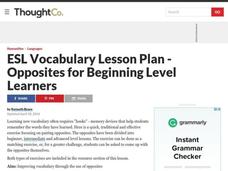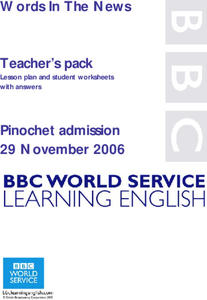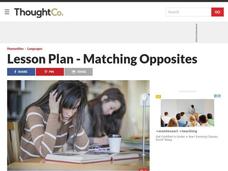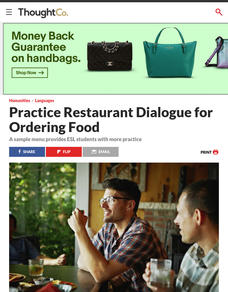ESL Library
Beginner Level Thanksgiving ESL Lesson Plan
Thanksgiving is a cherished tradition in the United States and Canada. Introduce the beginnings of the Thanksgiving celebration with a resource that features reading comprehension activities, vocabulary exercises, and a short...
ESL Kid Stuff
Actions - Present Continuous
What are you doing? Why, studying the present continuous tense, of course. Language learners engage in activities and exercises that provide them with practice crafting and answering questions using the present continuous tense.
ESL Kid Stuff
Past Tense Activities - Irregular Verbs: Part 1
As part of a series of resources designed for English learners, a language arts lesson prompts kid engage in activities and exercises that focus on the past tense of irregular verbs.
ESL Kid Stuff
Describing People (Adjectives)
As part of a series of lessons focusing on the parts of speech, language learners engage in games and exercises that encourage them to use adjectives to describe people.
Houghton Mifflin Harcourt
Silly Stories: English Language Development Lessons (Theme 1)
ESL/ELD learners are provided extra support with the Houghton Mifflin Harcourt thematic units on silly stories by this packet of activities, exercises, and practice sets.
Curated OER
ESL Vocabulary Lesson Plan - Opposites for Beginners
Students work on vocabulary lesson plans.
Curated OER
How New Words are Created
Students complete a matching activity, matching words with "method of formation." In this language arts lesson, students complete sentences using rhyming pairs, break down words into 2, and complete a creative exercise, blending 2 words...
Curated OER
Words In The News
A complete resource from BBC World Service provides informational text for English or ESL classes to teach vocabulary, grammar, and reading skills. Learners participate in small group work, whole class discussions, and role-plays to...
Houghton Mifflin Harcourt
Amazing Animals: English Language Development Lessons (Theme 4)
This packet, the second in the series of support materials for the Houghton Mifflin Harcourt thematic units on amazing animals, contains exercises and activities designed for the ESL/ELD classroom.
Curated OER
Jobs
High schoolers practice their vocabulary skills. In this language arts lesson, students examine pictures and textbook questions in order to expand their vocabulary related to jobs and careers.
Curated OER
Lesson Plan - ESL Vocabulary Lesson Plan - Opposites for Advanced Level Learners
Students in small groups work on opposites worksheet.
ESL Kid Stuff
Numbers 1-20
Language learners engage in a series of games and activities designed to help them recognize and name the numbers from ten to twenty.
ESL Kid Stuff
Adverbs
Run quickly. Walk slowly. Jump high. As part of their study of English parts of speech, language learners engage in a series of activities designed to introduce them to the descriptive power of adverbs.
Curated OER
Speaking and Listening Lesson Based on Ordering Food in a Restaurant
Pupils practice the skill of ordering food in a restaurant. After a lecture/demo, students work in pairs. Utilizing a worksheet imbedded in this plan, they gain practice in the skill of ordering food from a menu.
Curated OER
IDENTIFYING PARTS OF THE BODY
Students identify and describe the various parts of the body therefore, practicing English vocabulary, pronunciation, and spelling. They discuss the various body parts, some of the inner organs and also, their functions. Finally,...
Curated OER
Countable and Uncountable Nouns - Noun Quantifiers
Students solidify their knowledge of countable and uncountable nouns and their quantifiers. The lesson includes a number of overlooked or idiomatic expressions to help higher level students expand their knowledge.
Curated OER
Introductory Lesson for Lower Intermediate Classes
Students introduce and converse with classmates as they review basic tense structures.
Curated OER
What's Wrong - Intensive Reading
There are different types of reading meant for different texts. Discuss four of these with your emerging readers. When does one perform an extensive or intensive reading? When does one skim or scan a text? How are these all different?

















